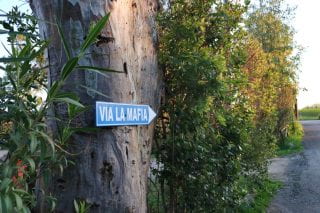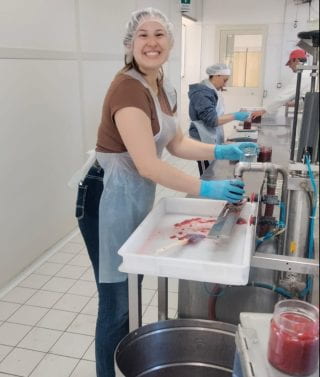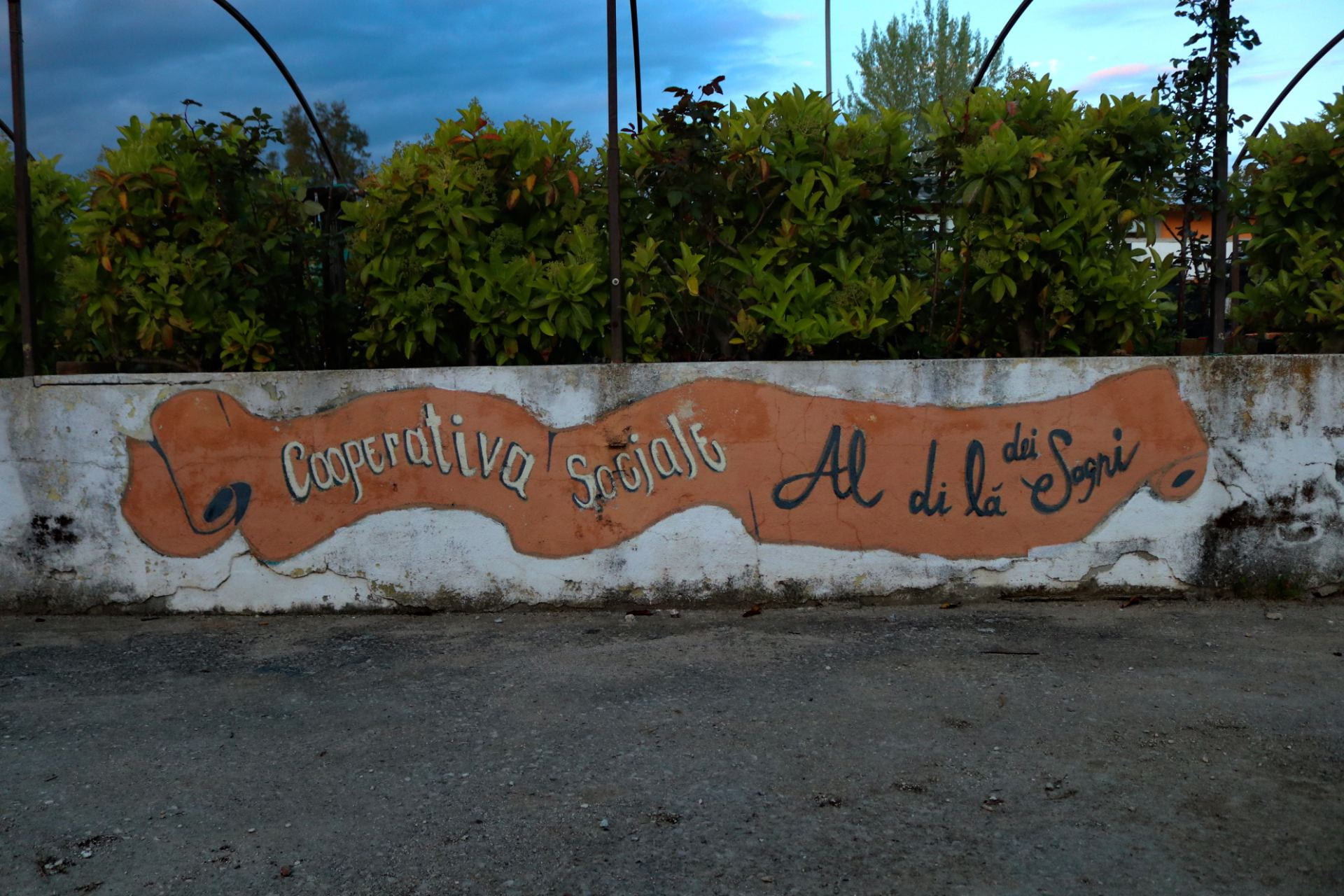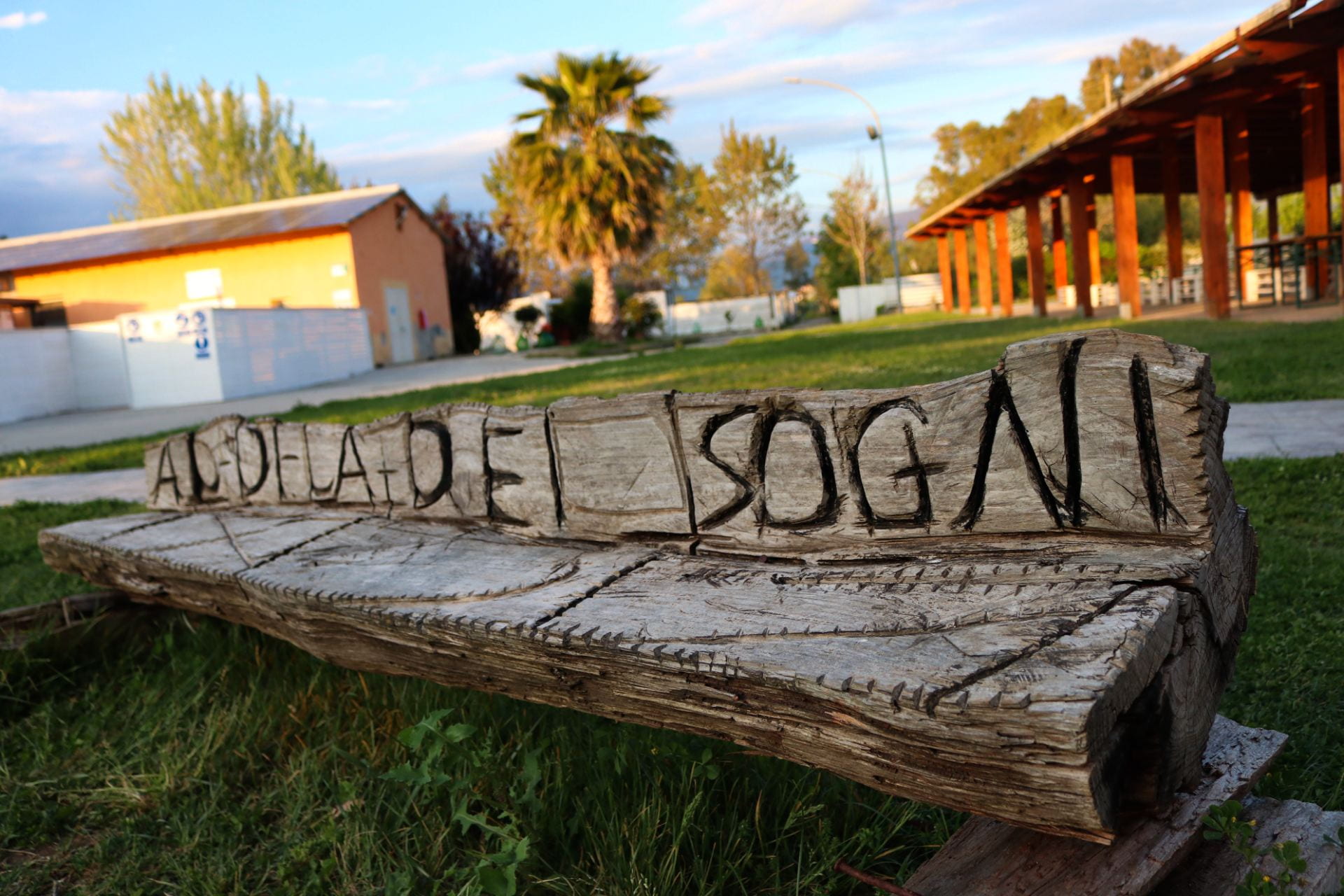 |
Kati Rod is an honors agricultural business and international business student from Kennedale, Texas. With an Honors College Study Abroad Grant, Rod recently finished a semester abroad in Rome, Italy with the University of Arkansas Rome Center. While in Rome, she was invited to visit a social cooperative, a Cooperativa Al di là dei Sogni, as a class and weekend excursion. Rod had the opportunity to volunteer at the cooperative, interview the owner and spend a few unforgettable days with the employees. Learn more about her solo adventure and how she discovered the courage not to be unique.
The Cooperativa Al di là dei Sogni is a social cooperative in Sessa Arunca, Italy. Rather than focusing on selling a product, it is centered on creating a space for its employees. Its mission to support people makes it unique, but being unique is the last thing that founder Simmaco Perillo wants. He dreams of his business model being replicated around the world.
Simmaco and his wife Paula have built a place where people are central, and second chances are standard. His goal was to “provide jobs to people to give a different kind of shine.” The Cooperative employs those with mental disabilities, criminal records, and current inmates who have the opportunity for work placements. Additionally, the Cooperative sits on a piece of property that was once an asset to the local mafia group, the Camorra.
A Place Beyond Dreams
I learned about Al di là dei Sogni in my Global Changemakers class at the University of Arkansas’ Rome Center this semester. We originally took a class trip to visit the cooperative along with several other repurposed mafia lands in the area. During this time, I spoke to one of their volunteers, Giulio, and he told me how the cooperative had impacted his life and gave me some insight into the company’s mission. Once back in Rome, I decided I wanted to go back to learn more about the company and how it achieves its unique goals. I spoke to my professor about it, and she created a project for me to complete and set up my experience at Al di là dei Sogni. With her help, I was able to spend two days staying and volunteering at the cooperative.
The name of the Cooperative reflects its mission as “al di là dei sogni,” or “beyond dreams.” During our conversation, I asked Simmaco what gave him the courage to create a place beyond what he alone could imagine. He told me that the word “courage” in Latin means “heart.” So, to do anything “with courage,” really means to do it “with heart.” Therefore, when you learn how to do things with passion, you already have courage. This means that everyone who is doing something that they are passionate about, is living life with courage. Simmaco added that everyone can relate to the feeling you get when you help someone. Why not make it his job?
Al di là dei Sogni currently employs about forty people on and off the farm. When the business first started, Simmaco relied on social services and the national health care system in his search for employees. However, as his business grew, his mission spread and soon people came to him. Here is where the Cooperative excels in building the business around its people. There is no set number of positions or designated roles. Rather, as people come, a space is created for them.
The Cooperative itself offers a hostel, restaurant, and several products that are made on the property. Additionally, they host school groups, trainings, retreats, and other events. They also sell boxes called Pacco alla Camorra (Package to the Camorra), that are collections of products made at the Cooperative and their partner operations. The names on the boxes honor and spread awareness about their mission of repurposing land that was once used by the Camorra.
The Cooperativa Al di là dei Sogni has become successful because of its deep respect for people, its desire to overcome mafia history, and the value of the relationships that it has created. Moving forward, Simmaco’s hope is that the Cooperative would not be praised for its uniqueness, but rather become one of many replications around the world. He hopes that similar places will be created to serve all people, everywhere.
“You Need to Start to Dream Again”
“You need to start to dream again” was Simmaco’s answer when I asked him if he had any advice for young people who want to make a difference but are not sure how to start. This had been a recurring theme in my life recently, and when Simmaco said that I could feel the weight of conviction in my chest as the air left my lungs. Dreams and community have echoed their way through my semester and my experience at Al di là dei Sogni was no different.
“You need to start to dream again.” As Simmaco put it, dreaming is not about taking in the beauty of the sky, but about believing in yourself. Dreaming is doing everything with passion, with courage, and with intentionality.
“You need to start to dream again, but you have not to dream alone.”
This was the second half of Simmaco’s advice. He told me that when you share your dream it’s going to be real because it is going to become part of your community. If not, it’s just you alone.
Building Community Without Words
I saw this principle put into practice while staying at Al di là dei Sogni. From the way that everyone had a seat at the table no matter how small that table was. Seriously, there were eight of us sitting around a table the size of an extra-large pizza one afternoon. I heard it in every desperate attempt at a conversation with the American girl who came to Italy knowing zero Italian. I felt it when my heart sank saying goodbye to people that I had met only forty-eight hours earlier.
While I was at Al di là dei Sogni, I made the coolest connections with people I could barely speak to. I love talking to strangers. In restaurants, on the street, in the airport–I love hearing their stories and perspectives. That is one of the things that I have missed most while being in Italy because I do not speak Italian. The most heart-breaking feeling I have come across this semester is the genuine look on someone’s face when they are trying to make you understand but you cannot comprehend their words. However, I have also been able to find an amazing beauty in the effort that overcomes language barriers. I have been truly humbled this semester by the amount of hand motions and chunky sentences that were used to communicate, and it was no different at Al di là dei Sogni.
However, the few employees at Al di là dei Sogni who spoke English made sure that I was taken care of during my stay. Monica took care of my schedule and always made sure that I had everything I needed. Besides making one of my favorite meals in Italy, Antonio, the chef at Al di là dei Sogni, spoke English and was happy to make conversation with me every time our paths crossed. The first night I arrived, he introduced himself and shared his story of learning English in London and how he ended up working at Al di là dei Sogni. At the end of our conversation, Antonio said something that I think is applicable everywhere you go: “we all have our problems, but we all have big hearts.” That is the mission of Al di là dei Sogni and I believe it is a good summation of what community looks like worldwide.
Errands and Ice Cream
The next morning, I started work at 8:30. I had no idea what that entailed, all I knew was that I was going to the factory. As we walked in, Monica handed me a hair net, a plastic apron, and booties to cover my shoes. She introduced me to Anna, a short blonde woman with a sweet smile who took care of me all day. She instructed me to cut strawberries, taught me how to properly peel the skins of lemons, and made sure I had a front row seat to how everything worked inside the factory. This is also where I got to know Francesco, a father and the one in charge of operating the big machine that cooks the jam at the factory.
Later in the afternoon when all the work was done, in true “dad fashion,” Francesco asked me if I wanted to take a trip into town for gelato with him and Mino, another man I met the night before. I am never one to say no to ice cream of any kind, so of course I said yes. An hour later, the men came rolling up in style with the windows down, sunglasses up, and music blaring. I knew I was in for an adventure. Even though I do not speak Italian and they did not speak much English, it was one of my favorite adventures in Italy. It was on this trip that I began to understand why Italians are so keen on talking with their hands: it really does help get the message across. After taking care of the pickups and returns at the mall we went in search of the gelato shop. Once we found it, Francesco did not like the look of the gelato that was at that stand so Mino led us down the road near the seaside to a place that he loved. He was right, it was some of the best gelato I had in Italy and the view of the sea was incredible.
When we got back to the Cooperative, the number of tables in the dining room had doubled from the night before and the patio outside was buzzing with people all around. That was the night that I met Lauradonna, Vincenzo, Erasmus, and so many others. I loved that dinner not only because it was just as good as the last, but because of the people who I was able to eat with. Conversation on my side of the table was limited because of the difference in language, but many smiles were shared, and I loved every second of it.
Sharing Our Stories
During day two at Al di là dei Sogni I planted onions and beans with a man named Daniele. Daniele is from Columbia originally and his first language is Spanish. I know some Spanish so that is how we communicated while we dug holes and placed seeds. While we worked, he told me about his life, his family, and how he ended up in Italy. Daniele’s story is one I will not forget. The joy he displayed in his work was inspiring and his guidance was thoughtful.
During this time, the high school group that was visiting for the day learning about the mafia came to join us in the field. They helped us plant and I got to speak with one of the girls who told me this was their last stop on a tour of seized mafia lands. Seeing them learning reminded me of all the things that I have learned this semester and all the things that I was still learning as I dropped seeds into the ground that day.
It also struck me that those students did not know Daniele’s story the way that I did. They were there to learn about the mafia while my goals related more toward business and community. Working and actively participating at Al di là dei Sogni gave me a new perspective of what a business model can look like and has inspired me to act in my own communities when I get home.
In forty-eight hours, I made jam, rode into town for errands and gelato, planted onions and beans, and made friends whose stories and smiles are still at the forefront of my mind. In forty-eight hours, I witnessed a dream go way beyond a business that had absolutely nothing to do with selling. In forty-eight hours, I learned what it means to have courage, and what it looks like to humble yourself and dream with the courage to not be unique.
Simmaco and his wife Paula have built a place where people are central, and second chances are standard. His goal was to “provide jobs to people to give a different kind of shine.” The Cooperative employs those with mental disabilities, criminal records, and current inmates who have the opportunity for work placements. Additionally, the Cooperative sits on a piece of property that was once an asset to the local mafia group, the Camorra.
A Place Beyond Dreams
 |
| The goat on the right was a newborn the first time I went to Al di là dei Sogni. By the time I went back, he was twice the size and thriving all on his own! |
I learned about Al di là dei Sogni in my Global Changemakers class at the University of Arkansas’ Rome Center this semester. We originally took a class trip to visit the cooperative along with several other repurposed mafia lands in the area. During this time, I spoke to one of their volunteers, Giulio, and he told me how the cooperative had impacted his life and gave me some insight into the company’s mission. Once back in Rome, I decided I wanted to go back to learn more about the company and how it achieves its unique goals. I spoke to my professor about it, and she created a project for me to complete and set up my experience at Al di là dei Sogni. With her help, I was able to spend two days staying and volunteering at the cooperative.
The name of the Cooperative reflects its mission as “al di là dei sogni,” or “beyond dreams.” During our conversation, I asked Simmaco what gave him the courage to create a place beyond what he alone could imagine. He told me that the word “courage” in Latin means “heart.” So, to do anything “with courage,” really means to do it “with heart.” Therefore, when you learn how to do things with passion, you already have courage. This means that everyone who is doing something that they are passionate about, is living life with courage. Simmaco added that everyone can relate to the feeling you get when you help someone. Why not make it his job?
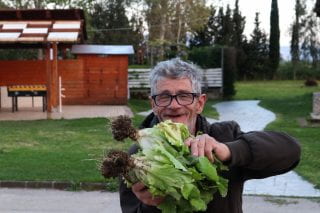 |
| Erasmus picked lettuce for our dinner on Friday night and never failed to wave at me on the opposite end of the table. |
Al di là dei Sogni currently employs about forty people on and off the farm. When the business first started, Simmaco relied on social services and the national health care system in his search for employees. However, as his business grew, his mission spread and soon people came to him. Here is where the Cooperative excels in building the business around its people. There is no set number of positions or designated roles. Rather, as people come, a space is created for them.
The Cooperative itself offers a hostel, restaurant, and several products that are made on the property. Additionally, they host school groups, trainings, retreats, and other events. They also sell boxes called Pacco alla Camorra (Package to the Camorra), that are collections of products made at the Cooperative and their partner operations. The names on the boxes honor and spread awareness about their mission of repurposing land that was once used by the Camorra.
The Cooperativa Al di là dei Sogni has become successful because of its deep respect for people, its desire to overcome mafia history, and the value of the relationships that it has created. Moving forward, Simmaco’s hope is that the Cooperative would not be praised for its uniqueness, but rather become one of many replications around the world. He hopes that similar places will be created to serve all people, everywhere.
“You Need to Start to Dream Again”
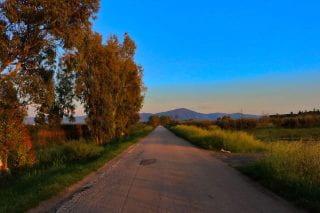 |
| Sunset on the road leading to Al di là dei Sogni. |
“You need to start to dream again” was Simmaco’s answer when I asked him if he had any advice for young people who want to make a difference but are not sure how to start. This had been a recurring theme in my life recently, and when Simmaco said that I could feel the weight of conviction in my chest as the air left my lungs. Dreams and community have echoed their way through my semester and my experience at Al di là dei Sogni was no different.
“You need to start to dream again.” As Simmaco put it, dreaming is not about taking in the beauty of the sky, but about believing in yourself. Dreaming is doing everything with passion, with courage, and with intentionality.
“You need to start to dream again, but you have not to dream alone.”
This was the second half of Simmaco’s advice. He told me that when you share your dream it’s going to be real because it is going to become part of your community. If not, it’s just you alone.
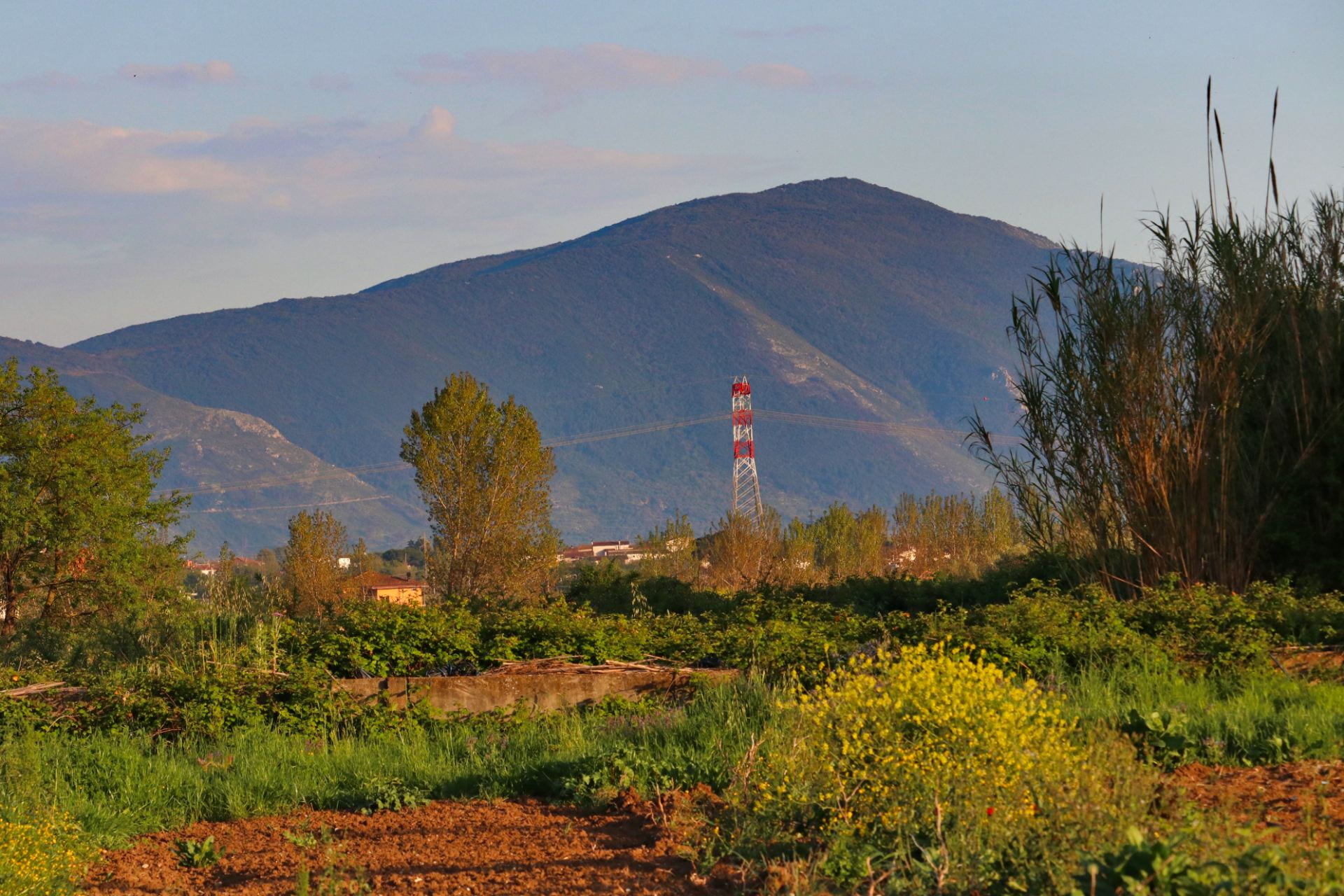 |
| View from the field where I planted onions with Daniele. Street with bright blue sky: Sunset on the road leading to Al di là dei Sogni. |
Building Community Without Words
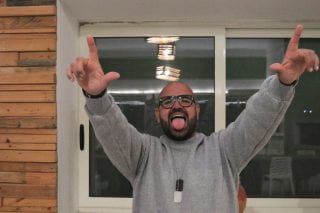 |
| Gaetano fixed my broken door that was not actually broken, and instead taught me how my door worked on my second day at The Cooperative. |
I saw this principle put into practice while staying at Al di là dei Sogni. From the way that everyone had a seat at the table no matter how small that table was. Seriously, there were eight of us sitting around a table the size of an extra-large pizza one afternoon. I heard it in every desperate attempt at a conversation with the American girl who came to Italy knowing zero Italian. I felt it when my heart sank saying goodbye to people that I had met only forty-eight hours earlier.
While I was at Al di là dei Sogni, I made the coolest connections with people I could barely speak to. I love talking to strangers. In restaurants, on the street, in the airport–I love hearing their stories and perspectives. That is one of the things that I have missed most while being in Italy because I do not speak Italian. The most heart-breaking feeling I have come across this semester is the genuine look on someone’s face when they are trying to make you understand but you cannot comprehend their words. However, I have also been able to find an amazing beauty in the effort that overcomes language barriers. I have been truly humbled this semester by the amount of hand motions and chunky sentences that were used to communicate, and it was no different at Al di là dei Sogni.
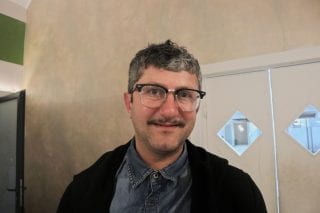 |
| Antonio wears a red coat and chef’s hat when in the kitchen, and I have never seen a more perfect icon of a chef. |
However, the few employees at Al di là dei Sogni who spoke English made sure that I was taken care of during my stay. Monica took care of my schedule and always made sure that I had everything I needed. Besides making one of my favorite meals in Italy, Antonio, the chef at Al di là dei Sogni, spoke English and was happy to make conversation with me every time our paths crossed. The first night I arrived, he introduced himself and shared his story of learning English in London and how he ended up working at Al di là dei Sogni. At the end of our conversation, Antonio said something that I think is applicable everywhere you go: “we all have our problems, but we all have big hearts.” That is the mission of Al di là dei Sogni and I believe it is a good summation of what community looks like worldwide.
Errands and Ice Cream
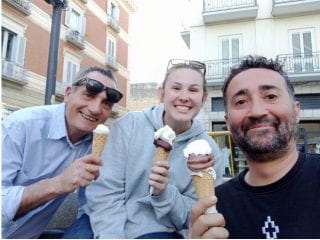 |
| These are the men who came zooming through the gates to pick me up for ice cream. Francesco is on the right, and Mino is on the left. |
The next morning, I started work at 8:30. I had no idea what that entailed, all I knew was that I was going to the factory. As we walked in, Monica handed me a hair net, a plastic apron, and booties to cover my shoes. She introduced me to Anna, a short blonde woman with a sweet smile who took care of me all day. She instructed me to cut strawberries, taught me how to properly peel the skins of lemons, and made sure I had a front row seat to how everything worked inside the factory. This is also where I got to know Francesco, a father and the one in charge of operating the big machine that cooks the jam at the factory.
Later in the afternoon when all the work was done, in true “dad fashion,” Francesco asked me if I wanted to take a trip into town for gelato with him and Mino, another man I met the night before. I am never one to say no to ice cream of any kind, so of course I said yes. An hour later, the men came rolling up in style with the windows down, sunglasses up, and music blaring. I knew I was in for an adventure. Even though I do not speak Italian and they did not speak much English, it was one of my favorite adventures in Italy. It was on this trip that I began to understand why Italians are so keen on talking with their hands: it really does help get the message across. After taking care of the pickups and returns at the mall we went in search of the gelato shop. Once we found it, Francesco did not like the look of the gelato that was at that stand so Mino led us down the road near the seaside to a place that he loved. He was right, it was some of the best gelato I had in Italy and the view of the sea was incredible.
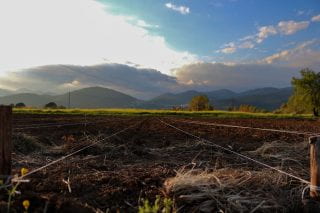 |
| These are the rows of beans that Daniele and I planted with the help of the high school students. |
When we got back to the Cooperative, the number of tables in the dining room had doubled from the night before and the patio outside was buzzing with people all around. That was the night that I met Lauradonna, Vincenzo, Erasmus, and so many others. I loved that dinner not only because it was just as good as the last, but because of the people who I was able to eat with. Conversation on my side of the table was limited because of the difference in language, but many smiles were shared, and I loved every second of it.
Sharing Our Stories
During day two at Al di là dei Sogni I planted onions and beans with a man named Daniele. Daniele is from Columbia originally and his first language is Spanish. I know some Spanish so that is how we communicated while we dug holes and placed seeds. While we worked, he told me about his life, his family, and how he ended up in Italy. Daniele’s story is one I will not forget. The joy he displayed in his work was inspiring and his guidance was thoughtful.
During this time, the high school group that was visiting for the day learning about the mafia came to join us in the field. They helped us plant and I got to speak with one of the girls who told me this was their last stop on a tour of seized mafia lands. Seeing them learning reminded me of all the things that I have learned this semester and all the things that I was still learning as I dropped seeds into the ground that day.
It also struck me that those students did not know Daniele’s story the way that I did. They were there to learn about the mafia while my goals related more toward business and community. Working and actively participating at Al di là dei Sogni gave me a new perspective of what a business model can look like and has inspired me to act in my own communities when I get home.
In forty-eight hours, I made jam, rode into town for errands and gelato, planted onions and beans, and made friends whose stories and smiles are still at the forefront of my mind. In forty-eight hours, I witnessed a dream go way beyond a business that had absolutely nothing to do with selling. In forty-eight hours, I learned what it means to have courage, and what it looks like to humble yourself and dream with the courage to not be unique.

